There was no doubt in Ron Maassen’s mind where his father’s latest military honor would be displayed.
“It’s going back to Wisconsin,” he said. “We still have the old family house where I grew up. There’s a wall that has many of his other honors hung. There’s a little museum and memorial right there for him.”
Maassen’s father, Ralph, was honored during a ceremony at Sedona City Hall on Saturday, Oct. 12, in which he posthumously received the Congressional Gold Medal for his service in World War II, primarily for his time as a member of the 492nd Bombardment Group of the Eighth Air Force, nicknamed the Carpetbaggers.
The medal, as well as a flag that flew over the U.S. Capitol, were presented to Maassen by U.S. Rep. Tom O’Halleran [D-District 1], who said only 3,520 Congressional Gold Medals have been presented since the Civil War. The medal was originally presented to those who served in the military but over the years it’s included civilians as well.
“I never met your dad but I’m sure he was a brave, brave man,” O’Halleran said to 30 people in attendance. “We have had attacks but no wars on our soil in more than 100 years and that’s thanks to brave people like Ralph.”
According to the National Museum of the U.S. Air Force, in 1943 the Office of Strategic Services — the forerunner of the CIA — called upon the U.S. Army Air Forces to conduct special operations from the United Kingdom. Aircrews started flying leaflet-dropping missions in October 1943, but plans called for them to fly dangerous, clandestine missions deep into the heart of occupied Europe. The majority of these missions secretly airdropped supplies by night to partisan fighters, under the code name Operation Carpetbagger.
Once in range, the aircrew contacted the partisans on the ground with an “S-Phone,” a special two-way radio, to receive final drop instructions and to verify that the ground parties really were partisans and not Germans.
A cargo hatch, called the “Joe Hole,” replaced the B-24 Mitchell bomber’s ball-turret, and parachutists, called “Joes,” dropped through it. Special blisters for the pilot and copilot’s windows allowed greater visibility, and blackout curtains replaced the waist guns.
“The men of the 492nd Bombardment Group stayed busy delivering arms, ammunition, passengers and gasoline desperately needed by the advancing Allied armies,” the website states. “However, they soon returned to the dangerous work — nighttime delivery of supplies and Joes. Ranging much further into Nazi-occupied territory than before, the Carpetbaggers made deliveries to Norway, Denmark and Germany.”
After the ceremony, Maassen said that he was told of the medal nearly five years ago.
“The wheels of government move slowly,” he said, laughing. “I think this is well deserved recognition. It’s nice to see the history of some of these more obscure units be brought to the forefront. Very few people know about the Carpetbaggers.”
He said his father, who died in 2003, would be proud of the award.
“I think he would have been happy to have received it but he definitely would have been very humbled by it,” he said. “He would have been happier about the recognition given to his crewmates.”



















